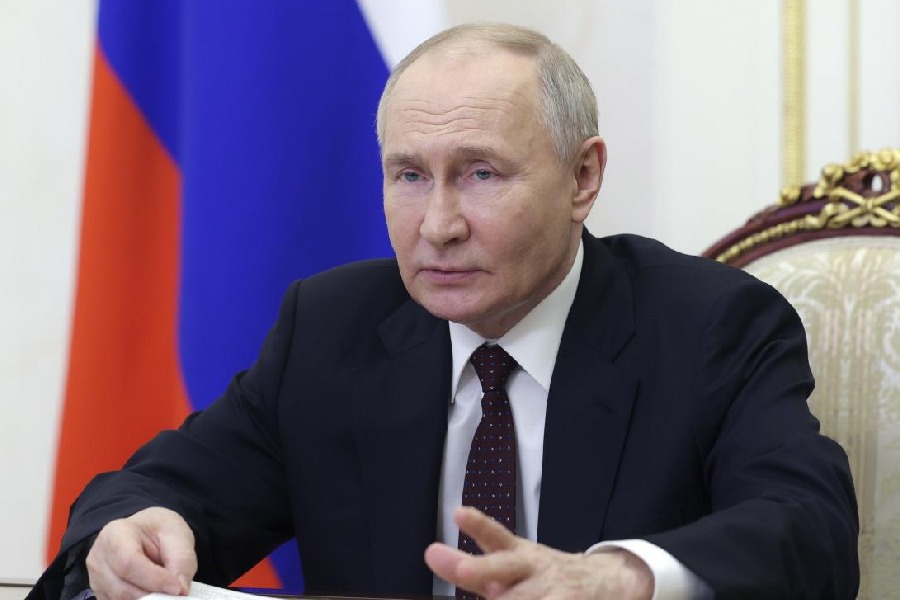Russian President Vladimir Putin said Friday that Moscow's offensive in Ukraine's northeastern Kharkiv region aims to create a buffer zone but has no plans to capture the city.
Putin's comments on a trip to China were his first on the offensive launched on May 10, which opened a new front in the war and displaced thousands of Ukrainians within few days. It came hours after a massive Ukrainian drone attack on the Russia-occupied Crimean Peninsula early Friday caused power cutoffs in the city of Sevastopol after an earlier attack damaged aircraft and fuel storage at an airbase. In southern Russia, Russian authorities said the attack on Friday also set a refinery ablaze.
Moscow launched attacks in the Kharkiv region in response to Ukrainian shelling of Russia's Belgorod region, Putin told reporters Friday on a visit to Harbin, China.
“I have said publicly that if it continues, we will be forced to create a security zone, a sanitary zone,” he said. “That's what we are doing.”
Putin said that Russian troops were “advancing daily according to plan" and said that there were no plans to capture Kharkiv, for now.
Ukrainian troops were fighting Friday to halt Russian advances in Kharkiv region that began late last week.
The town of Vovchansk, located 5 kilometers (3 miles) from the Russian border, has been a hot spot in the fighting in recent days. Ukrainian authorities have evacuated around 8,000 civilians from the town. The Russian army's usual tactic is to reduce towns and villages to ruins with aerial strikes before its units move in.
By starting the new offensive, Russian troops “expanded the zone of active hostilities by almost 70 kilometers” (about 45 miles), in an effort to force Ukraine to spread its forces and use reserve troops, Ukraine's military chief, Col. Gen. Oleksandr Syrskyi, said Friday. In the Kharkiv region, Russian forces have advanced 10 kilometers from the border, President Volodymyr Zelenskyy told reporters on Friday.
Separately, in his strongest remarks yet on Ukraine's upcoming peace conferences slated for next month, Putin said it was a vain attempt to enforce terms of a peaceful settlement on Russia. Putin emphasized that Russia wasn't invited to the Swiss-hosted meeting.
He said that Russia was ready for talks but shrugged off Ukrainian Zelenskyy's peace formula as wishful thinking. He said that prospective peace talks could be based on a draft deal that was negotiated by Russia and Ukraine during their Istanbul talks in 2022.
Meanwhile, the drone raids on Crimea marked Kyiv's attempt to strike back during Moscow's offensive in northeastern Ukraine, which has added to the pressure on outnumbered and outgunned Ukrainian forces, which are waiting for delayed deliveries of crucial weapons and ammunition from Western partners.
A Ukrainian intelligence official confirmed to The Associated Press that Ukraine's Security Service and Military Intelligence conducted a joint operation to strike Russia's military infrastructure sites in Novorossiysk, on the Black Sea coast, and occupied Sevastopol. The official spoke on condition of anonymity, because they weren't authorized to comment publicly.
The operation targeted ships and vessels of the Russian Black Sea Fleet and was conducted by aerial drones built in Ukraine, the official said.
The Russian Defense Ministry said that air defenses downed 51 Ukrainian drones over Crimea, another 44 over the Krasnodar region of Russia and six over the Belgorod region. It said Russian warplanes and patrol boats also destroyed six sea drones in the Black Sea.
At least three fighter jets were destroyed in an earlier attack in Crimea a few days ago, according to satellite imagery of the airbase provided by Maxar Technologies.
Mikhail Razvozhayev, the governor of Sevastopol, which is the main base for Russia's Black Sea Fleet, said the drone attack damaged the city's power plant. He said it could take a day to fully restore energy supplies and warned residents that power would be cut to parts of the city.
“Communal services are doing their best to restore the power system as quickly as possible,” he said in a statement.
Razvozhayev also announced that schools in the city would be closed temporarily.
Earlier Ukrainian attacks damaged aircraft and a fuel storage facility at Belbek air base near Sevastopol, according to satellite images released by Maxar Technologies.
In the Krasnodar region, the authorities said a drone attack early Friday caused a fire at an oil refinery in Tuapse which was later contained. There were no casualties.
Ukraine has repeatedly targeted refineries and other energy facilities deep inside Russia, causing significant damage.
The Krasnodar region's governor, Veniamin Kondratyev, said fragments of downed drones around the port of Novorossiysk caused several fires, but there were no casualties.
Belgorov Gov. Vyacheslav Gladkov said that a Ukrainian drone struck a vehicle, killing a woman and her 4-year-old child. Another attack set a fuel tank ablaze at a gas station in the region, he said.
In addition to Kharkiv, recent Russian offensive attacks have come in the eastern Donetsk region, as well as the Chernihiv and Sumy regions in the north and in the southern Zaporizhzhia region. The apparent aim is to stretch depleted Ukrainian resources and exploit weaknesses.
Having strengthened their grouping in the northern region, Russian forces are now concentrating their efforts to advance near the village of Lyptsi, as well as the town of Vovchansk, according to Syrskyi, the Ukrainian military commander.
Syrskyi also said he inspected the units that are “preparing for defense” of the Sumy region. On Tuesday, the head of Ukraine's Military Intelligence, Kyrylo Budanov, reportedly said that the Russian army had plans to start offensive actions in Sumy.
Russia has also been testing defences at other points along the roughly 1,000-kilometer (620-mile) front line, which snakes from north to south through eastern Ukraine. That line has barely changed over the past 18 months, in what has become a war of attrition.











